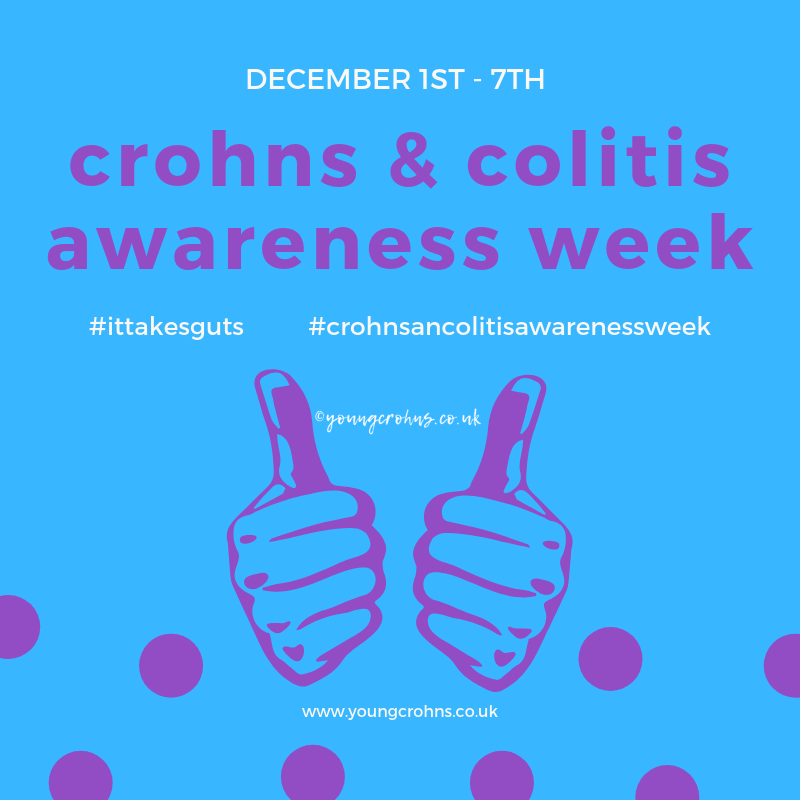What’s nice about being an adult and living with IBD is making all your own medical decisions. I remember sitting in my hospital bed and being given my morning medication and being told to take it right then and there. I was 23 years old. I wasn’t a child but I was a newly diagnosed patient with Crohn’s Disease and never taken tablets before in my life. This was all…
awareness
-
-
World IBD Day 2019
“We know It Takes Guts to talk about Crohn’s and Colitis. This World IBD Day, we are supporting people to start conversations that really matter. Crohn’s and Colitis are invisible illnesses and because of the stigma that surrounds them, thousands of people are suffering in silence. It’s time to speak up.” – Crohn’s and Colitis UK This year, Crohn’s and Colitis UK have launched a new website –…
-
Crohns & Colitis Awareness Week – December 7th: Not All Superheroes Wear Capes
Part of the week of daily blogs for #crohnsandcolitisawarenessweek Read the entire week here. “I’m thankful for my struggle because without it I wouldn’t have stumbled across my strength” Somewhat of a cliche now, but it’s a cliche because it’s true. I was diagnosed at 23 when I knew nothing about anything. Sure, I had graduated university, lived away from home, lived in a foreign country; but I knew nothing…
-
Crohns & Colitis Awareness Week – December 6th: Surgery – Treatment Option or Last Resort?
Part of the week of daily blogs for #crohnsandcolitisawarenessweek Read the entire week here. I went through all medical options before I turned to surgery to help my IBD. Some days I wonder if I left it too long or was it just right? Some days I wonder what would have happened if I had gone for the clinical trial instead of the resection. But then I remember the life…
-
Crohns & Colitis Awareness Week – December 5th: Misconceptions
Part of the week of daily blogs for #crohnsandcolitisawarenessweek Read the entire week here. “When they said chronic I didn’t think. They meant every single damn day.” Chronic and invisible. Double whammy. Despite there being so much information out there about the basics of IBD, we as patients still experience misconceptions and misinformation throughout our patient journey. For some this can be the fact that at a primary level, IBD…
-
Crohns & Colitis Awareness Week – December 4th: Fatigue
Part of the week of daily blogs for #crohnsandcolitisawarenessweek Read the entire week here. For most, tiredness comes when you’re overdoing it – working too many hours, being social, finding things to do instead of sleep. But when you have a chronic illness, the fatigue is a next level of tiredness. I find myself stopping from saying ‘I’m tired’ because this invites so many people to say the same back…
-
Crohns & Colitis Awareness Week – December 3rd: IBD and Mental Health
Part of the week of daily blogs for #crohnsandcolitisawarenessweek Read the entire week here. There, I said it. Once you say it outloud, it’s like duh of course it does but that is as far some go. It’s sort of expected for something some internal to affect your mind. And whilst that’s good to recognise, more needs to be done. If there is counselling for a cancer diagnosis, why is there…
-
Crohns & Colitis Awareness Week – December 2nd: IBD Stigma
Part of the week of daily blogs for #crohnsandcolitisawarenessweek Read the entire week here. What does having IBD mean? It means talking about poo. It means discussing bodily functions with specialists. It means enduring testings on your digestive system. These are not great experiences, no matter how long you have been diagnosed or how many you’ve had to go through. It means getting diagnosed. It means having a conversation with…
-
Crohns & Colitis Awareness Week – December 1st: What is IBD?
Part of the week of daily blogs for #crohnsandcolitisawarenessweek Read the entire week here. What are Crohn’s & Colitis? Crohn’s Disease and Ulcerative Colitis are the major categories of inflammatory bowel diseases (IBD). IBD affects an estimated 300,000 in the UK. These chronic diseases can run in families and they affect males and females equally. While IBD can affect anyone, Caucasians are more likely than other ethnic groups to have IBD. Yet…





